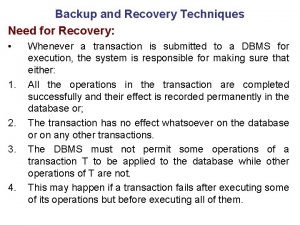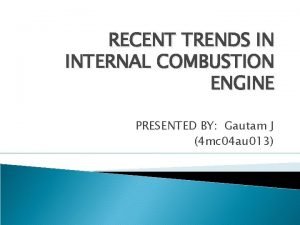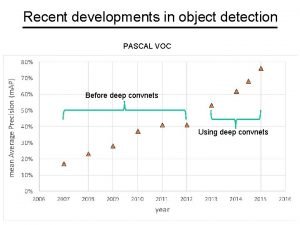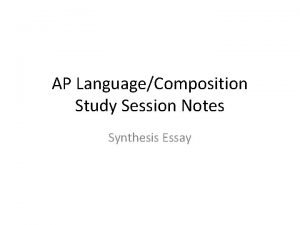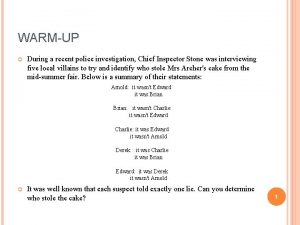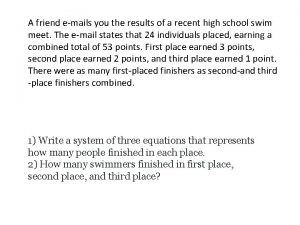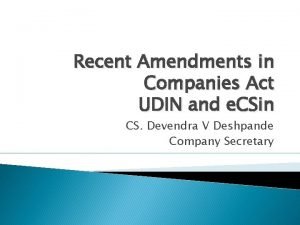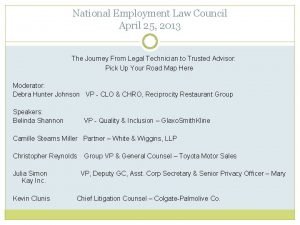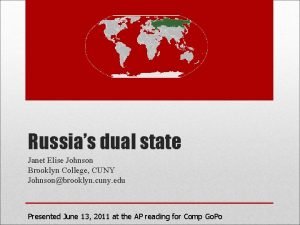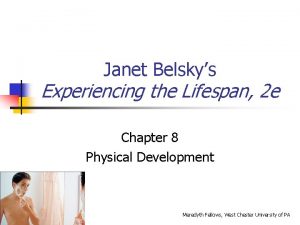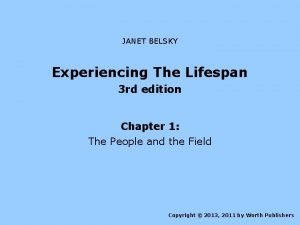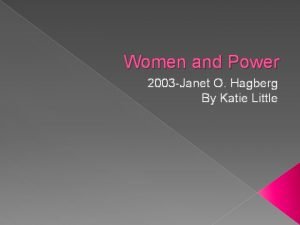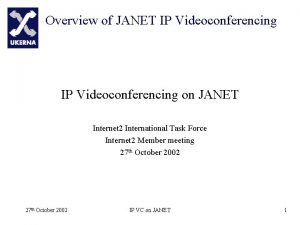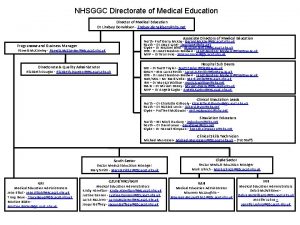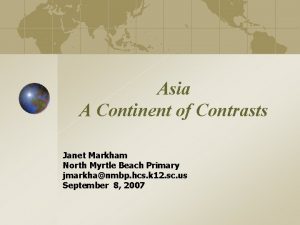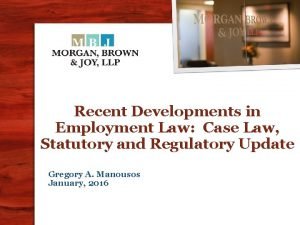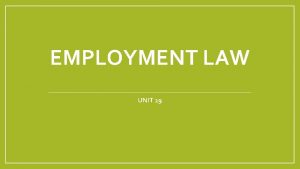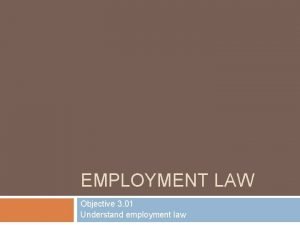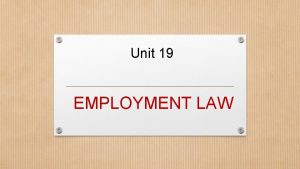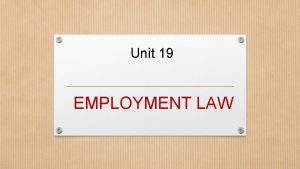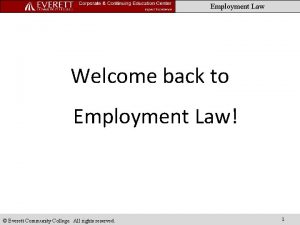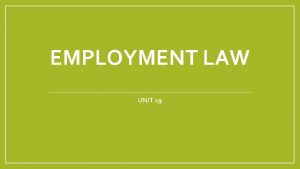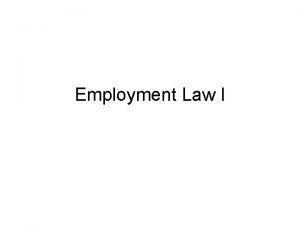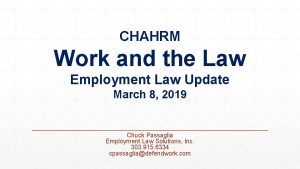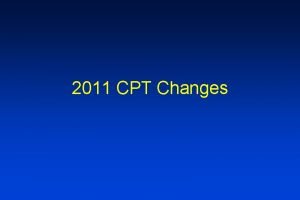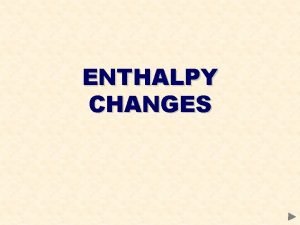EMPLOYMENT LAW UPDATE RECENT EMPLOYMENT LAW CHANGES Janet











































- Slides: 43

EMPLOYMENT LAW UPDATE RECENT EMPLOYMENT LAW CHANGES Janet Copeland, Principal NZPPA 6 th Annual Conference & Payroll Expo 2013

Overview • Recap Recent Employment Law Changes • Review Proposed Employment Law Changes • Cases of Interest

Employment Law Changes 1 April 2013 • Changes to Kiwisaver • Minimum wage increase • Starting out wage (1 May 2013) • ‘Mondayisation’ of Waitangi and ANZAC Days

Changes to Kiwisaver • Minimum rate contributions increase from 2% to 3% gross salary and wages from 1 April 2013. • Contribution rates 4% & 8% remain unchanged

Kiwisaver cont’d • Default position – compulsory employer contributions (CEC’s) paid in addition to employees gross salary or wages • Fails to apply where: -Employee started new employment and/or gave notice requiring deductions on or after 15 December 2008 - “contractual terms and conditions do not account for the amount of compulsory contributions the employer is required to pay” • Don’t deduct CEC if hourly rate falls below minimum wage.

Minimum Wage Increase • Adult minimum wage increased $13. 50 to $13. 75 • New entrants’ and training minimum hourly wage increased $10. 80 to $11. 00 or 80% of adult minimum wage (1 April 2013) – Aged 16 or 17, >200 hours or >3 months employment (whichever is shorter) – Aged 16+ recognised industry training involving at least 60 credits.

Starting Out Wage • 1 May 2013 • New entrants and training wage replaced by ‘Starting Out Wage’ • Incentive for employers to give young people a start in the workforce • 16 – 19 year olds (not supervising or training other workers)

Starting Out Wage cont’d • Paid no less than 80% minimum wage for adults – 16 & 17 year olds in first 6 months of work – 18 & 19 year olds in first 6 months of work, after 6 months or more on a benefit – *New entrants wage employees remain on it until 200+ hours/3 months work completed – *Aged 16 to 19 on training wage remain on it.

“Mondayisation” Bill • Holidays (Full Recognition of Waitangi Day and ANZAC Day) Amendment Act 2013 • Comes into force 1 January 2014 • Practical effect – Anzac Day 2015 and Waitangi Day 2016

“Mondayisation” cont’d • Where Waitangi Day or ANZAC Day fall on Saturday or Sunday: – Holiday celebrated on that day for non-employment purposes i. e. dawn services – Employees ordinarily working on the weekend, public holiday falls on normal day – Employees who do not ordinarily work on a weekend, following Monday treated as public holiday *Public holiday: time and a half + alternative holiday.

Valuing Parental Leave • Parental Leave entitlements increased • From 1 July 2013: – Maximum entitlements increased from $475. 16 to $488. 17 – Minimum entitlements increased from $135. 00 to $137. 50 • Proposed Amendment to allow for 6 months paid leave – Member’s Bill 1 R 25 July, Subs 5 Oct. , Report due 19 Sep ‘ 13.

LOOKING FORWARD: - PROPOSED CHANGES - POLICY POINTS

Employment Relations Amendment Bill • • • Good faith & the disclosure of information Flexible working arrangements Vulnerable employees Collective bargaining Rest and meal breaks.

Good Faith & the Disclosure of Information Massey University v Wrigley (Emp. C, April 2011) • Court's broad interpretation • University had failed to comply with section 4(1 A)(c) of the Employment Relations Act by failing to provide all information "relevant" to the decision about their future employment. – All relevant information, including information about other candidates in a selection process, must be provided during a restructuring, including information not written down; • Disclosure of personal information: Privacy Act 1993

Disclosing Information in Good Faith • Currently all information relevant to a proposed decision that may adversely affect an employee, must be provided unless “good reason” exists not to. • Bill attempts to resolve conflicting obligations about the disclosure of personal information under the ERAct and Privacy Act to lessen uncertainty created for employers • Providing clarity as to what confidential information employers are required to provide to affected workers in situations such as dismissal or redundancy

Disclosing Information in Good Faith cont’d • Proposed changes would expand the excuse to disclose information: - About an identifiable individual other than the affected employee - Evaluative or opinion material compiled for the purpose of making a decision that may affect an employee’s continued employment (or ID of material’s author) - Subject to other statutory condition requiring confidentiality

Flexible Working Arrangements • Extend the right to request flexible working arrangements to all employees from the beginning of employment (removing requirement to have caring responsibilities and six months service) • Remove current limit on number of requests an employee may make over a 12 month period • Requirement to consider requests within a month (instead of three).

Vulnerable employees • Part 6 A – modify when and how vulnerable employees (cleaners, caregivers and caretakers) are affected by restructuring • Exemption for small to medium sized enterprises (19 or fewer employees) as incoming employer do not have to take on staff of an outgoing employer – recognises Part 6 A can create costs that are more easily absorbed by large employers • Timeframe of five working days for employees to elect to transfer to a new employer

Vulnerable employees cont’d • Obligation on the outgoing employer to provide detailed information on transferring employees • Default apportionment of liabilities for service related entitlements (like holiday pay) between employers • Implied warranty imposed on every outgoing employer that they have not changed to an employees’ entitlements to the detriment of an incoming employer

Bargaining Collectively • Remove obligation to conclude CEA unless genuine reason not to • Parties no longer required to continue to bargain when they have come to a standstill or have reached a deadlock if the Authority declares that bargaining has concluded • Repeal the ‘ 30 day rule” for new employees – covered by terms of dominant collective • Enables employers to offer and agree individual terms with new employees who are not union members

Bargaining collectively cont’d • Parties unable to reinitiate bargaining for 60 days after Authority declares bargaining over (or must continue bargaining for 60 days after Authority finds bargaining not over) • Allow employers to opt out of MECA bargaining • Ensures employers are no longer required to become party to a collective agreement with their competitors • Employers can initiate bargaining at the same time as the a union • Partial pay reductions for partial strikes and notifications • Require all parties to provide notice of strike / lock out

Rest and Meal Breaks • At present - inflexible Proposed changes • Increased flexibility • Encourages parties to negotiate rest and meal breaks in good faith • But allows an employer to impose restrictions where it is reasonable and necessary having regard to the nature of the employee's work.

Certifying Sickies • NZ Medical Council proposes changes to Statement on Medical Certification • Proposed changes – Change focus from what can’t be include to what can and should be included for receiving agency e. g. employer – Include duties the patient is fit for, & with patient’s permission, diagnosis and any workplace factors – Certificate to meet all standards in relevant legislation – More guidance for agencies and doctors re info. requests.

Sick Leave Cases • Wallace v Air New Zealand Ltd – Mr Wallace played golf during sick leave – Air NZ were criticised for not properly considering Wallace’s explanation that he was suffering stress from the recent death of both his parents • Kensington v Air New Zealand – Bank records and Facebook pages during period of sick leave = admissible – Relevant to veracity/credibility of her claims • Taiapa v Te Runaga O Turanganuia Kiwi Trust – Mr Taiapa took sick leave and attending Waka Ama Championships – “If an employee’s activities during a period of sick leave do not appear to be consistent with recuperation, this may justify inquiry by the employer to determine genuineness of the illness or injury” – Mr Taiapa was dismissed justifiably for misuse of sick leave

RECENT CASE LAW OF INTEREST

Idea Services Ltd v Dickson Facts: • D was a community service worker on $17. 66 per hour • Several nights a month D performed sleepovers for which he was paid between $3. 40 and $4. 30 per hour • During sleepovers D supported service users and ensured security but could otherwise sleep or quietly do as he wished • Constraints during sleepovers: – Could not leave the premises – No sleeping behind locked door i. e. , readily available – No consuming or being affected by alcohol or other drugs – No visitors w/o prior permission – No activities that would disturb

Idea Services Ltd v Dickson Held: • Sleepovers = ‘work’ for the purposes of minimum wage • D was therefore entitled to at least the minimum wage while performing sleepovers • Cannot average – workers must receive the minimum wage for each and every hour worked

Whyte v Feeny Facts: • Farm Assistant employed between 2 November 2010 and 19 October 2012 • Salary: $30, 000 per annum which rose to $32, 000 per annum in April 2012 • Hours: Required to work 49 -60 hours a week and 38 -44 hours a week in the dry season.

Whyte v Feeny Held: • The employee’s pay had averaged across the season but did not meet the minimum wage requirement for each hour worked • Weekly wages paid under the minimum wage cannot be offset against wages paid during the dry season. • Payment by way of salary is not an alternative or exception to avoid paying the minimum wage

Faitala v Terranova Homes & Care - Kiwi. Saver Facts: • Caregivers employed in rest home paid at MW • Total remuneration package deducted compulsory employer contribution (CECs) for Kiwi. Saver from MW Held: • EC held employer cannot deduct CEC from MW although clause sufficed for purposes of total rem. • Indication that deducting CEC from regular pay inconsistent with purpose of Kiwi. Saver legislation

Deducting Lawfully • Wages Protection Act 1983: No deductions from wages unless in accordance with Act • Employer may with written consent deduct BUT worker may vary or withdraw • Employer may recoverpayments in limited circumstances

Foai v Air New Zealand Limited Facts: • Mr Foai received 40 incorrect over payments totally $70, 428. 04. • Air NZ dismissed Mr Foai on the basis that there had been a fundamental breakdown in the trust and confidence – One reason being that he was not proactive enough in querying his overpayments • Air NZ sought to recover net of $42, 435. 40 arguing the money was paid by mistake

Foai v Air New Zealand Limited Held: • Air NZ failed to identify any actual mistake made by Payroll and the Court rejected the claim • Mr Foai had changed his position in reliance including marriage, accommodation, travelling • Mr Foai was entitled to rely on Air NZ to ‘get the figures right’ and not ‘misrepresent the amount of pay to which he was entitled’ • Employers must proactively monitor payments to employees and act quickly to prove and recover any overpayments

Part 6 A: Vulnerable employees • Vulnerable Employees are those providing: – – Cleaning services Food catering services Orderly services; or Laundry services • Part 6 A of the ERA provides protection to specified categories of employees when a business / contract is transferred • The employees have a right to elect to transfer to the new employer on the same terms and conditions

Pacific Flight Catering Ltd v LSG Sky Chefs NZ Ltd Facts: • A number of vulnerable employees transferred from Pacific Flight Catering to LSG Sky Chefs when a contract changed hands Held: • LSG was required to recognise each employees accrued entitlements to annual leave, alternative holidays, sick leave and bereavement leave not already taken • Court of Appeal held: Pacific is not obliged to reimburse LSG for these entitlements

Equal Pay Act 1972 • Long title: make provision for the removal and prevention of discrimination, based on the sex of the employees, in the rates of remuneration of males and females in paid employment • Interpretation: Equal pay means a rate of remuneration in which there is no element of differentiation between male and females based on the sex of the employees

SFWU v Terranova - Equal Pay Facts: • The Union claimed female caregivers receive a lower rate of pay than they otherwise would if the majority of the employees in the aged care sector were not female Held: • The comparator group must be ‘free from any gender bias’ • Comparator group = Males in the same industry (if free from gender bias) • If the above group is not free from gender bias the comparator group can be jobs ‘to which a similar value can be attributed using gender neutral criteria. • This broad interpretation can be ‘inconvenient or burdensome’ but not ‘unworkable or impractical’

Relevant Daily Pay (RDP)? • Amount of pay employee would have received had they actually worked • Includes all payments would otherwise have received on day: – Productivity/incentive-based payments (including commission) – Overtime – Cash value board/lodgings provided – Excludes superannuation payments and Time 1. 5

Postal Workers Union of Aotearoa Inc. v NZ Post Facts: • Posties employed by NZO required to work unrostered overtime if failed to finish their delivery round within the time allocated (standard hours) • “Cuts ups” to be worked if someone sick • No predictability of when required to work unrostered overtime • NZPost did not include payment for unrostered overtime in calculating RDP

Postal Workers Union of Aotearoa Inc. v NZ Post Held: • No distinction between s 9(1)(b)(ii) between rostered and unrostered overtime • NZPost had to try to establish unrostered overtime payment that would have been received • If unsuccessful, obliged to apply averaging formula • Section 9(1)(b)(ii) remains unchanged – include irregular overtime! • Average Daily Pay pragmatic solution moving forward – “if not reasonably practicable”

Key Points to Remember • Know your own and/or your clients’ obligations under the Holidays Act and related legislation - this helps to minimise any liability for getting it wrong • Keep up to date with changes (legislation & cases) • Contact us if you have any Questions

QUESTIONS? © Janet Copeland Law 2013

Disclaimer Janet Copeland Law and Janet Copeland produced this webinar and supporting materials to provide a brief summary of employment law issues and developments affecting employers and their businesses. Although we have taken care to ensure accuracy, details may be omitted that may be directly relevant to a particular entity. This presentation, supporting materials and the information contained within them do not purport to be and should not be used as specific legal or professional advice and we accept no responsibility for any errors or omissions or for any loss or damage resulting from reliance on or use of same. We recommend that you obtain legal advice specific to your situation before proceeding. © Copyright Janet Copeland Law 2013
 Recent demographic changes in the uk
Recent demographic changes in the uk Database backup and recovery techniques
Database backup and recovery techniques Elizabeth mulroney
Elizabeth mulroney Chemical changes examples
Chemical changes examples Recent trends in ic engine
Recent trends in ic engine Recent developments in ict
Recent developments in ict Recent developments in object detection
Recent developments in object detection Many recent college graduates have faced
Many recent college graduates have faced Explain recent trends in foreign trade of india
Explain recent trends in foreign trade of india Skimming and scanning examples
Skimming and scanning examples Modern trends in project management
Modern trends in project management Myips online
Myips online Biotaphonomy
Biotaphonomy After miguel's recent automobile accident
After miguel's recent automobile accident A friend emails you the results of a recent high school
A friend emails you the results of a recent high school Recent advances in ceramics
Recent advances in ceramics News report passive voice
News report passive voice Https drive google com drive u 0 recent
Https drive google com drive u 0 recent Udin generate icsi
Udin generate icsi Recent trends in mis
Recent trends in mis Comait
Comait National employment law council
National employment law council Basic employment law quiz
Basic employment law quiz Employment law alliance handbook
Employment law alliance handbook Janet elise johnson
Janet elise johnson Meet past simple
Meet past simple Janet leigh plaza
Janet leigh plaza Janet belsky
Janet belsky Nn teens
Nn teens Janet belsky
Janet belsky Janet dean fodor
Janet dean fodor Magnifying glass clipart
Magnifying glass clipart Janet tetrault general hospital
Janet tetrault general hospital Angela janet caldwell
Angela janet caldwell Janet barter
Janet barter Better wise up janet weiss
Better wise up janet weiss Janet hagberg
Janet hagberg Janet video conferencing
Janet video conferencing Dr janet gardner medwin
Dr janet gardner medwin Good catch program
Good catch program Janet markham
Janet markham Www.sqaacademy.org.uk
Www.sqaacademy.org.uk Wayne always obtrudes upon our conversations
Wayne always obtrudes upon our conversations Janet braam
Janet braam

